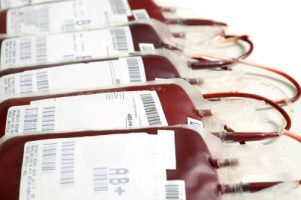- Home
- Editorial
- News
- Practice Guidelines
- Anesthesiology Guidelines
- Cancer Guidelines
- Cardiac Sciences Guidelines
- Critical Care Guidelines
- Dentistry Guidelines
- Dermatology Guidelines
- Diabetes and Endo Guidelines
- Diagnostics Guidelines
- ENT Guidelines
- Featured Practice Guidelines
- Gastroenterology Guidelines
- Geriatrics Guidelines
- Medicine Guidelines
- Nephrology Guidelines
- Neurosciences Guidelines
- Obs and Gynae Guidelines
- Ophthalmology Guidelines
- Orthopaedics Guidelines
- Paediatrics Guidelines
- Psychiatry Guidelines
- Pulmonology Guidelines
- Radiology Guidelines
- Surgery Guidelines
- Urology Guidelines
Restricted Red Cell Transfusions in Cardiac Surgery Patients prevent kidney injury: Clinical Trial

Restricted Red Cell Transfusions in Cardiac Surgery Patients turned out to be safer and helped prevent acute kidney injury, finds a Clinical Trial.
In a recent clinical trial of higher risk patients undergoing cardiopulmonary bypass surgery, a restrictive approach to blood cell transfusions resulted in fewer transfusions without putting patients at increased risk of acute kidney injury. The findings appear in an upcoming issue of JASN.
Reducing blood cell transfusions during surgery could prevent transfusion-related adverse effects, conserve the blood supply, and reduce healthcare costs, but it might also have negative effects on the kidneys due to a variety of mechanisms. To investigate, Amit X. Garg, MD, PhD, (Lawson Health Research Institute in Ontario) and his colleagues conducted a randomized clinical trial called TRICS-III. The trial included 4531 higher risk patients undergoing cardiopulmonary bypass surgery across 73 centers in 19 countries. Patients were randomized to a restrictive transfusion approach (transfuse only if hemoglobin is below 7.5 g/dL) or a more liberal approach (transfuse if hemoglobin is less than 9.5 g/dL).
Patients in the restrictive transfusion group received 38% fewer transfusions than patients in the liberal group (1.8 vs. 2.9 transfusions, on average, respectively), and the approaches were equally safe with respect to risk of acute kidney injury. Risk were similar between patients with and without chronic kidney disease before surgery.
“With over 20 million cardiac surgeries performed worldwide each year—with it being one of the more common reasons for using blood in the hospital and an average of about 3 units of red blood cells used per patient—this suggests that approximately 20 million units of blood transfusions could be avoided each year without influencing the chance that a patient will develop post-operative kidney injury,” said Dr. Garg.
In an accompanying editorial, Iain Macdougall, MD, PhD (King’s College Hospital, in the UK) and Toby Richards, MD (University of Western Australia) noted that the study represents one of the largest trials assessing acute kidney injury ever performed, but they pointed to several limitations.
For more details click on the link: http://dx.

Disclaimer: This site is primarily intended for healthcare professionals. Any content/information on this website does not replace the advice of medical and/or health professionals and should not be construed as medical/diagnostic advice/endorsement or prescription. Use of this site is subject to our terms of use, privacy policy, advertisement policy. © 2020 Minerva Medical Treatment Pvt Ltd